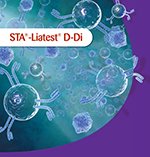Results of the DiET Study have been recently published in Blood coagulation fibrinolysis, July 2016.

Results of the DiET Study have been recently published in Blood coagulation fibrinolysis, July 2016. Autors are: Gilles Pernod, Haifeng Wu, Emmanuel de Maistre, John Lazarchick, Jeannine Kassis, Carlos Aguilar, Pascual M. Vera, Gualtiero Palareti, Armando D’Angelo and the DiET Study (Jeffrey Caterino, Fabienne Dutrillaux, Gary Headden, Colin Kaide, Maxime Maignan, Raphaël Marlu, Anais Richard, Cindy Tissier).
As a reminder, the DiET study has been conducted according to the stringent CLSI guideline H59 - endorsed by FDA- to extend the STA-Liatest D-Di Intended use from “Aid in the Diagnosis of PE” to “Exclusion of PE”.
This international, multicenter, prospective none randomized, management study is currently unparalleled in the field of coagulation in terms of number of international sites, number of enrolled patients and quality of study. 9 centers in Europe and North America have indeed enrolled more than 1,130 patients, enabling to determine and confirm the clinical performances of the STA-Liatest D-Di with a sensitivity of 97.6% (95% CI 91.7-99.7%) and a negative predictive value of 99.7% (95% CI 99.0-100%).
The article concludes that the STA-Liatest D-Di assay, when used in combination with the Wells’ score, has an NPV and sensitivity that exceed the CLSI and FDA requirements for pulmonary embolism exclusion. It also highlights that, as recommended by the CLSI H59 A guideline, using the assay in relevant patients would not only maximize the assay performance, but also minimise the economic healthcare burden avoiding unnecessary and expensive imaging tests.
